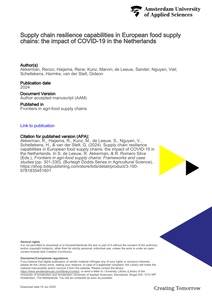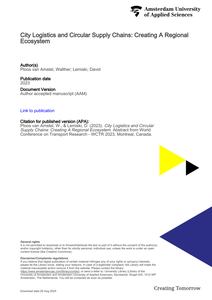Short Food Supply Chains (SFSCs) are gaining attention for their potential economic, environmental, and social benefits. However, they remain hindered by their small scale and lack of efficiency. This study explores the digital readiness of SFSC suppliers and assesses the potential impact thereof on the SFSC’s ability to scale up and gain efficiency. Through an embedded case study design, the study findings highlight a lack of digital readiness of SFSC actors. Their focus on personal relationships and internal processes is found to be incongruent with digitalization as an enabler of SFSC performance.
DOCUMENT
This chapter discusses supply chain management responses used by companies in the food supply chain during the recent COVID-19 pandemic. The chapter first discusses the relevant literature on supply chain resilience. The chapter subsequently reviews supply chain responses in relation to different supply chain resilience capabilities, and then discusses the theory and practice of supply chain capabilities in food supply chains.
MULTIFILE

Implementing circular urban supply chains is a major economic transformation that can only work if significant coordination problems between the actors involved are solved. This requires, on the one hand, the implementation of efficient urban collection technologies, where process industries collaborate hand-in-hand with manufacturers and urban waste treatment specialists and are supported by digital solutions. On the other hand, it also requires implementing regional ecosystems connected by innovative CO2-neutral circular city logistics systems smoothly and sustainably managing the regional flow of resources and data, often at large-scale and with interfaces between industrial processes and private and public actors. Develop blueprint for circular urban region This research project aims to develop a blueprint for circular urban regions, including the demonstration of a territorial cross-sectorial, large-scale and sustainable systemic solution for the circularity of high-performance plastics from diverse applications of rigid polyurethane (PU) foams used as insulation material in refrigerators and construction elements. The research project develops a blueprint for regional participative governance using an approach involving multiple actors from the public-, private-, academic-, and financial sectors and civil society (by working in living labs).The focus of the presentation (and paper) is on the control tower elements of the circular urban supply chain and the elements to make the collaboration work.In terms of urban logistics and collection services is to make these materials accessible for downstream sorting and recycling processes for the first time in a sustainable and economically viable way. The project will develop a new way of processing defined waste streams like appliances (refrigerators), to separate chemically recyclable PU from a mixed plastics waste stream.
DOCUMENT

The DPP4CD project, “Digital Product Passport(s) for Circular Denim: From Pilot to Practice,” focuses on delivering pilot and scalable Digital Product Passports (DPPs) in the circular denim industry. This aligns with the upcoming European Ecodesign for Sustainable Products Regulation (ESPR), making DPPs mandatory for textiles from 2027. A DPP for circular denim should clearly detail material composition, production methods, repair records, and recycling options to meet EU rules like ESPR, Corporate Sustainability Reporting Directive (CSRD) and European Sustainability Reporting Standards (ESRS). It combines dynamic lifecycle data into a standard, interoperable system that boosts traceability, cuts SME admin burdens, and supports sustainable, circular practices. Led by Saxion and HvA, the multidisciplinary project is based on a real-world Dutch use case with MUD Jeans, a leader in circular denim. The project combines circular economy principles with existing digital technologies, working with partners such as tex.tracer, Tejidos Royo, bAwear, Denim Deal, MODINT, EuFSI and, GS1 Netherlands. Instead of developing new tools, the project applies scalable technologies (augmented DPP extension) and methods e.g. blockchain, life cycle assessments, and traceability standards to denim supply chains. The project defines legal, environmental, technical, and user requirements for DPPs in circular denim and designs a modular, data-driven, and ESPR-compliant system that integrates offline and online components while ensuring interoperability, affordability, reliability, accountability, and scalability. It develops a data framework for material tracking, supported by interoperable digital solutions to improve data-sharing and transparency. A pilot DPP with MUD Jeans will cover the full lifecycle from production to recycling, enabling scalable DPP. The project aims to address societal challenges related to circularity, ensure scalable and implementable solutions, and create a digital platform where knowledge can be developed, shared, and utilised. By combining circular practices with digital technologies, DPP4CD will help textile businesses transition towards sustainable, transparent, and future-proof supply chains.
A major challenge in the textile sector is achieving true circularity while preventing fraud, including false sustainability claims and material mislabelling. The complexity of supply chains and outdated certification systems have resulted in a lack of accountability and transparency. This project addresses these issues by developing and implementing Digital Product Passports, integrated with digital trust mechanisms as verifiable credentials, to create a transparent, responsible, and accountable textile supply chain. The project traces the journey of a corporate fashion t-shirt from cotton sourcing in India to production and distribution in the Netherlands, ensuring full transparency and traceability. Its goal is to drive a shift towards a circular economy by fostering collaboration across the supply chain and empowering stakeholders, particularly Tiers 3 and 4 in the Global South. Schijvens Corporate Fashion leads the effort with regenerative cotton sourcing through Raddis®Cotton, utilising Aware™’s technology solution. Adopting a ‘Fibre-Forward’ approach, the consortium ensures traceability by integrating data from raw material sourcing to end-user. This approach benefits all stakeholders, from farmers to garment producers, by providing verifiable information on fibre origins, social conditions, and ecological impacts. By tracking each fibre and collecting direct data, the project removes the opacity that can undermine sustainability claims. The project enhances accountability and sustainability compliance by utilising decentralised technologies for product verification. Integrating digital identity wallets for individuals and organisations, secured with verifiable credentials, enhances trust and accountability, fostering circular economy practices. Rather than seeing DPPs as the end goal, the project views them as catalysts for systemic change. It prioritises continuous improvement, collaboration, and shared benefits, aiming to establish a regenerative circular economy. Through a practical toolkit, the project will help organisations and policymakers navigate DPP adoption, strengthening transparency and creating a scalable, inclusive system for supply chains across the Global South and -North.
Globalization has opened new markets to Small and Medium Enterprise (SMEs) and given them access to better suppliers. However, the resulting lengthening of supply chains has increased their vulnerability to disruptions. SMEs now recognize the importance of reliable and resilient supply chains to meet customer requirements and gain competitive advantage. Data analytics play a crucial role in developing the insights needed to identify and deal with disruptions. At the company level, this entails the development of data analytic capability, a complex socio-technical process consisting of people, technology, and processes.At the supply chain level, the complexity is compounded by the fact that multiple actors are involved, each with their own resources and capabilities. Each company’s data analytic capability, in combination with how they work together to share information and thus create visibility in the supply chain will affect the reliability and resilience of the supply chain. The proposed study therefore examines how SMEs can leverage data analytics in a way that fits with their available resources and capabilities to improve the reliability and resilience of their supply chain.Collaborative partners:Logistics Community Brabant, Transport & Logistiek Nederlands (TLN), SMINK, Kennis Transport, Logistiek Digitaal, Devoteam.